Libya Prepares For Landmark Elections: Will Militias Or Islamists Take Control?
ANALYSIS

This Saturday, Libyans will vote in National Assembly elections, the first democratic elections since Moammar Gadhafi was defeated after 42 years of autocratic rule.
Close to 4,000 candidates are running for just 200 seats -- 120 allotted for regional blocs and 80 for political parties. The elections are the first, necessary step in forming a constitutional government, a process that could take more than a year to complete. The constituent assembly, which is essentially a congress, will be tasked with picking a new prime minister and drafting a constitution.
Libya's next government will still be seen by many as just another, if more robust, interim government, Jacob Mundy, an assistant professor of Peace and Conflict Studies at Colgate University, explained in Foreign Policy Magazine.
Yes, the National Assembly will appoint a new cabinet and, more importantly, a commission to draft Libya's post-Gadhafi constitution. These processes, however, will take place under duress.
After overseeing rebel forces during the Libyan revolution, the National Transitional Council, or NTC, smoothly assumed control of the country after the fall of the Gadhafi regime. The NTC said initially that it would give up power as soon as the rebels declared victory, but logistics and security issues have keep it at the helm.
The biggest problem facing the NTC and Libya in general over the past eight months has been the rise of local militias and militant tribes, which, if they haven't already, threaten to tear apart the peace and unity promised during the revolution. Although violence in Tripoli has been generally contained, independent militias have seized control of many cities, and in the south, Tabu tribesmen have been clashing with NTC forces, and dozens of people have reportedly been killed in recent weeks.
Additionally, the takeover of Gadhafi's vast weapons supplies means that almost every Libyan (and Chadian or Sudanese with a clear smuggling route) has access to arms, and can form a bloc to protect themselves from either rival factions or the government itself.
The NTC's lack of authority, poor communication and stalled reforms have meant that some Libyans have reverted to local tribal allegiances, explained Spiked Magazine's Patrick Hayes. It has also meant that Libya's old federal regions, which evolved under Italian rule, have taken on an increased significance, and cities such as Benghazi and Misrata have staged council elections in defiance of NTC wishes.
This poses a challenge in the elections, and candidates are promising to protect local voters' interests rather than putting rebuilding the government first. Meanwhile, the NTC is hoping that the newly elected body will begin to counteract trends like the eastern oil-rich Cyrenaica region declaring itself a semi-autonomous state in March -- a move that the transitional government said would split the country.
One of the biggest questions of this election is whether or not local militias can be trusted with a truly national role, to serve the national interest rather than home interests, according to Mundy. This question was partly answered last weekend, when armed protestors attacked election committee offices in Benghazi and Tobruk, burning ballots and ballot boxes in defiance of a number of issues including the lack of a constitution and the failures of the federalism movement in the east.
Additionally, in the eastern town of Ajdabiya the main storage center for election materials in Libya was allegedly set ablaze on Thursday by unknown arsonists, while on Friday, armed federalists shut down two oil terminals in the port city of Ras Lanuf in protest not receiving more seats in the elections, the AFP reported. Some eastern leaders are threatening to boycott the election because they are only being given 60 seats in the constituent assembly, while Tripoli and western Libya will get more than half of the 200 seats.
Southern Libya, which is predominately desert, will get 38 seats.
Along with the militias, one of the trends in this electoral process is the rise of Islamists. As in other Arab Spring countries like Egypt and Tunisia, Islamist parties like Libya's Muslim Brotherhood and others have gained political prominence by campaigning on a particularly religious agenda but are speaking broadly about democracy, human rights and the rule of law, according to Tara Bahrampour of the Washington Post.
But unlike Egypt and Tunisia, Libya's Islamists, who were exiled under Gadhafi, have little organizational experience and so their potential policies and visions for Libya are unknown to the average voter. Nonetheless, the Islamists, confident of victory, have already begun negotiating with Mahmoud Jibril, Libya's wartime prime minister and current head of the prominent National Forces Alliance, about their role in the post-election government.
Moreover, the NTC said on Thursday that sharia law should influence Libyan policies going forward. NTC spokesman Saleh Darhoub stated that because the Libyan people are attached to Islam, as a religion and legislation ... the National Transitional Council recommends that the (next) congress make sharia the main source of legislation.
Along with the Brotherhood's Justice and Construction party, the National Forces Alliance is also expected to fare well during the elections, as is the established Belhadj's al-Watan, or Homeland party. Still, the current situation in Libya means that there is no clear best choice for Libya's 2.7 million registered voters.
© Copyright IBTimes 2025. All rights reserved.





















